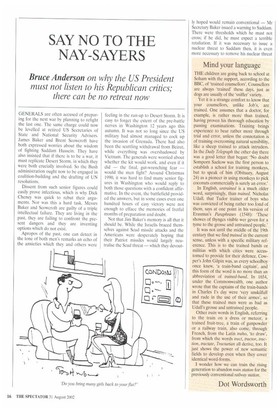Mind your language
THE children are going back to school at Soham with the support, according to the BBC, of 'trained counsellors'. Counsellors are always 'trained' these days, just as dogs are usually of the 'sniffer' variety.
Yet it is a strange comfort to know that your counsellors, unlike Job's, are trained. One assumes that a doctor, for example, is rather more than trained, having proven his thorough education by passing examinations. Training brings experience to bear rather more through trial and error, unless the connotation is of training overcoming natural sensibility, like a sheep trained to attack intruders. In the Daii)., Telegraph the other day there was a good letter that began: 'No doubt Sompom Saekow was the first person to establish a school for training monkeys, but to speak of him (Obituary, August 24) as a pioneer in using monkeys to pick coconuts commercially is surely an error.'
In English, untrained is a much older word, surprisingly, than trained. Nicholas Udall, that Tudor trainer of boys who was convicted of being rather too fond of them, says at one point in his version of Erasmus's Paraphrases (1548): 'These showes of thynges visible wer geven for a tyme to the grosse and untrained people.'
It was not until the middle of the 19th century that we find trained in the current sense, unless with a specific military reference. This is to the trained bands or militias with which cities were accustomed to provide for their defence. Cowper's John Gilpin was, as every schoolboy once knew, 'a train-band captain', and this form of the word is no more than an abbreviation of trained-band. In 1654, under the Commonwealth, one author wrote that the captains of the train-bands in Charles I's day were 'very unskilfull and rude in the use of their armes', so that these trained men were as bad as Udall's grosse and untrained people.
Other train words in English, referring to the train on a dress or meteor, a trained fruit-tree, a train of gunpowder or a railway train, also come, through French, from the Latin traho, 'to draw', from which the words tract, tractor, traction, tractate, Tractarian all derive, too. It just shows the power of new semantic fields to develop even when they cover identical word-forms.
I wonder how we can train the rising generation to abandon train station for the previously conventional railway station.
Dot Wordsworth


























































 Previous page
Previous page